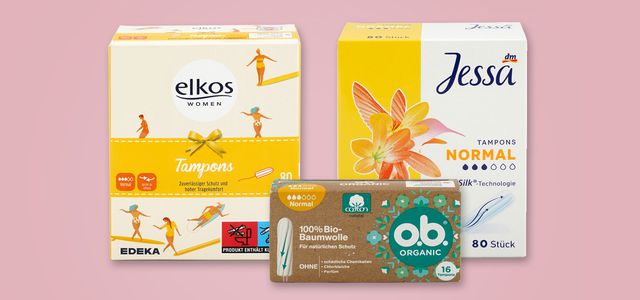
A menstruating person bleeds for almost seven years in their lifetime. Many use tampons when they have their period. Öko-Test now examined well-known tampon brands and came to a pleasing result: almost all of them are “very good”.
Tampons are the first choice for many menstruators during their period, although there is now a lot of competition from other products such as menstrual cups. The little white helpers made of cotton wool are handy and reliable. This is another reason why tampons are often chosen.
Öko-Test has now 19 different tampons examined more closely. Among the test products are Branded products, private label tampons from drugstores and tampons from discounters. All have a “three droplet” strength, which is suction power for use with normal bleeding. Only three “super” products were tested – these brands are from Italy, Great Britain or Sweden. Six of the tested tampons are made of organic cotton.
Read Öko-Test tampons as an ePaper
In the test, the tampons were examined for harmful substances (on the outside and inside) and checked in the laboratory for superfluous optical brighteners, for skin-irritating formaldehyde from fiber-stabilizing additives and for controversial organohalogen compounds that can come from the bleaching of the material. The products were also tested for traces of nonylphenol ethoxylates, which the textile industry uses as surfactants in washing processes. The tampons and packaging were also screened for environmentally harmful compounds such as PVC. Last but not least, the testers also subjected the tampons to an extensive practical test and checked whether the withdrawal thread broke, whether the suction power was appropriate and whether it was easy and convenient to use.
Öko-Test tampons: Generally “very good”
The good news: all the tampons performed well. 17 out of 19 products received the best rating, while the remaining tampons were able to achieve a “good” overall rating. Points were deducted for both products because the retrieval thread is only moderately tear-resistant.
among the Test winners in conventional tampons are among others:
- Elkos Women Tamponsnormal (from Edeka)
- Jessa Tamponsnormal (from dm)
- whether Extra Protect Tampons NormalDay and Night (by Johnson & Johnson)

Both Organic cotton tampons were all products “very good” rated, including:
- Organyc 16 tamponsgreat (by Corman)
- whether organic tamponsnormal (from Johnson & Johnson)
The environment also benefits from products made from organic cotton, because the natural fiber is grown without pesticides, artificial fertilizers or genetic engineering. In addition, organic tampons usually do without a plastic fleece around the absorbent core.
Read Öko-Test tampons as an ePaper
By the way, during the day it is enough to cleanse yourself with water. Aggressive cleaning products can irritate the sensitive mucous membranes in the intimate area. Excessive hygiene with cleaning products is generally not advisable, as they disturb the healthy vaginal environment. However, you can also find gentler alternatives to soaps in the 2021 Öko-Test for intimate wash lotions.
Sufficient hygiene must of course still be ensured, especially when inserting or removing tampons. Also to prevent infections. In addition, tampons should not remain in the body for too long, for example to avoid toxic shock syndrome, which can sometimes be life-threatening.
Sponge, cup, panties: Sustainable alternatives to tampons
Reusable menstrual products are becoming more popular as they reduce waste. More sustainable alternatives to tampons & Co. are, for example, washable period underwear, washable pads or menstrual cups. Öko-Test has already carried out studies on the alternatives, for example the Öko-Testers only tested menstrual cups in March 2022.

However, the use of alternative menstrual products does not only have advantages from the point of view of waste prevention. Harmful substances and plastic can also be avoided by using alternatives. For example, traces of plastic compounds such as PET, polyethylene (PE) or polyester (PES) were found in all conventional tampons tested (as well as in a product made of organic cotton). You can therefore do without plastic, among other things, if you only use tampons made of organic cotton, or if you switch to more sustainable alternatives completely.
Further information you find on www.ökotest.de and in the current issue 05/22 by Öko-Test.
Read more on Techzle.com:
- No money for tampons: why we need to do something about period poverty
- Menstrual sponge: what it is and how to use it
- 13 Amazing Things That Can Be Made Without Plastic